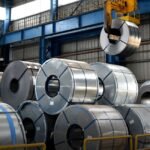Recent Posts
China Ends Aluminium, Copper Export Subsidies: Impact on India’s Market and Prices

China’s recent decision to terminate export subsidies for aluminium and copper has sent shockwaves across global metals markets. Aluminium prices on the London Metal Exchange (LME) surged by 5.5% to 8.5% intraday, marking their most significant gain in over a year. This development has profound implications for India’s metals sector, influencing both producers and end-users.
For Indian aluminium producers like Hindalco, NALCO, and Vedanta, the move is a boon. With reduced competition from Chinese exports, these companies stand to benefit from higher global prices, potentially boosting their revenues. However, the ripple effects on Indian industries reliant on aluminium—such as automotive, construction, and packaging—are less favorable. Higher input costs could strain profit margins, impacting overall industry growth.
Peter McGuire, speaking on ET NOW, highlighted that the pricing changes are not solely due to China’s policy shift. He pointed to volatility in the coal market and fluctuations in the US dollar index as additional factors influencing aluminium, zinc, and copper prices. McGuire cautioned traders about potential market whipsawing in the coming months, driven by ongoing US-China trade tensions and possible tariff implementations by the US.
China’s removal of export incentives is also likely to alter the dynamics of global trade. The move could curb Chinese dominance in the metals market, forcing a re-evaluation of supply chains worldwide. For India, this presents an opportunity to enhance its market share but also raises concerns over cost escalations in sectors dependent on aluminium.
In addition to metals, McGuire addressed the oil market outlook. Brent crude prices have fallen to around $75 per barrel, driven by structural weaknesses and reduced geopolitical risks. Looking ahead, Brent prices could dip to the high $60s if global tensions remain subdued.
For India, the dual impact of rising aluminium prices and potentially lower oil costs will shape economic and industrial strategies. While metal producers may thrive, industries reliant on aluminium could face a challenging landscape with increased production costs.
Recent Posts
Categories
- AP30
- Apartments4
- Bengaluru94
- Budget 202520
- Cement85
- Chennai254
- Construction480
- CREDAI9
- Editors Pick42
- Equipment13
- Events10
- GST4
- Highways40
- Housing78
- Hyderabad31
- Industrial166
- Infrastructure256
- Interiors10
- Iron Ore13
- Karnataka14
- Kerala18
- Land42
- Market Updates150
- Metal7
- Metro68
- Mining4
- MSME6
- News1,266
- NHAI23
- Paints28
- Properties1
- Puducherry4
- Real Estate375
- Road131
- Sand13
- Short News117
- SIPCOT1
- Steel Daily287
- Stocks5
- Tamil Nadu215
- Technology32
- Telangana11
- Trade2
- Trending News883
- Video1
Related Articles
Asian Paints Braces for Sluggish Growth Amid Weak Demand, Monsoon Impact
Asian Paints, India’s largest paint manufacturer, has cautioned about muted near-term growth...
ByKanmani ChokkalingamJuly 30, 2025Johnson Lifts Commits ₹300 Cr to R&D, Eyes Residential Market Growth with New Retrofit Solutions
Johnson Lifts is gearing up for a major innovation push with plans...
ByKanmani ChokkalingamJuly 30, 2025Tata Steel Goes Digital: Eyes 72-Hour Steel Delivery, Inspired by Zomato and Blinkit
Tata Steel is reimagining its delivery model with a digital-first approach, drawing...
ByKanmani ChokkalingamJuly 30, 2025Jindal Stainless Powers India’s Smart Infrastructure Push with Steel, Sustainability, and Digital Transformation
Jindal Stainless stands poised to play an important role in changing the...
ByKanmani ChokkalingamJuly 30, 2025















Leave a comment